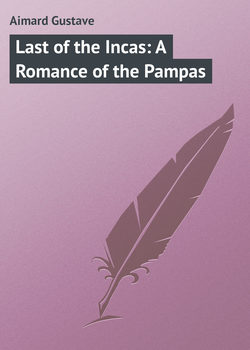Читать книгу Last of the Incas: A Romance of the Pampas - Aimard Gustave, Gustave Aimard, Jules Berlioz d'Auriac - Страница 6
CHAPTER VI.
NOCOBOTHA
ОглавлениеA struggle to the death was preparing between these irreconcilable enemies, the bomberos and the Indians; and on this occasion it seemed as if the advantage would be on the side of the brothers.
Mercedes, who had recovered from her fainting fit, felt so terrified that she regretted that she had awoken again.
After the first collision, Nocobotha fell back a step, lowered his weapon, made Pincheira a sign to imitate him, and with folded arms walked towards the brothers.
"Stay," he cried, "this fight will not take place; it is not proper for men to risk their lives in disputing for the possession of a woman."
An ironical smile contracted the bronzed faces Of Pedrito's brothers, while Pincheira stamped his foot impatiently. The Indian chief continued, without heeding these marks of disapproval —
"A man's blood is precious. Take away your sister, my good fellow. I give her to you; may she be happy with you."
"Our sister!" the three young men exclaimed with amazement.
"Yes," Pedrito said; "but what conditions do you exact?"
"None," the chief answered nobly.
Nocobotha's generosity was the more disinterested because the bomberos perceived by the first rays of the rising sun a band of nearly one thousand Indians, well equipped, and painted and armed for war, who had silently advanced and formed a a circle round them.
"Can we," Pedrito asked, "trust to your word, and have we no cause to fear a trap?"
"My word," the Ulmen answered haughtily, "is more sacred than that of a white man. We have, like you, noble feelings, more so, perhaps, than others," he added, pointing to a red line that traversed his face; "we know how to forgive. You are free, and no one will disturb your retreat."
Nocobotha followed the thoughts of the bomberos on their faces. The latter felt themselves conquered by the magnanimity of the chief, who smiled triumphantly on divining their astonishment and confusion.
"My friend," he said to Pincheira, "let fresh horses be given to these men."
Pincheira hesitated.
"At once," he said, with a gesture full of supreme grace.
The Chilian, who was a semi-savage, yielding involuntarily to Nocobotha's superiority, obeyed, and five horses of great value, and ready saddled and bridled, were led up by two Indians.
"Chief," Pedrito said, in a slightly shaking voice, "I am not grateful for my life, as I do not fear death; but, in my brothers' names and my own, I thank you for our sister. We never forget an insult or a kindness. Farewell! Perhaps I shall someday have the opportunity to prove to you that we are not ungrateful."
The chief bowed without answering. The bomberos grouped round Mercedes, returned his salute, and went off slowly.
"Well, it was your wish," Pincheira said, shrugging his shoulders in vexation.
"Patience!" Nocobotha answered, in a deep voice.
During this time an immense fire had been kindled at the foot of the tree of Gualichu, where the Indians, whose superstitious fears had been dissipated with the darkness, had again assembled in council. A few paces behind the chiefs, the Aucas and Puelche horsemen formed a formidable cordon round the council fire, while Patagonian scouts dashed about the desert to scare away intruders, and insure the secrecy of the deliberations.
In the east the sun was darting forth its flames, the dry and naked desert was blended with the illimitable horizon; in the distance the Cordilleras displayed the eternal snow of their peaks. Such was the landscape, if we may call it so, in which these barbarous warriors stood, dressed in strange costumes near the symbolic tree. This majestic scene involuntarily recalled other times and other climates, when, by the light of burning towns, the ferocious companions of Attila rushed to the conquest, and rejuvenescence of the Roman world.
Nocobotha took up his speech at the point where it had been interrupted by the unexpected interference of the bombero.
"I thank my brother Metipan," he said, "for the gift of the white slave. From this day our disagreement ceases; his nation and mine will form one and the same family, whose herds will peacefully graze on the same pasturage, and whose warriors will sleep side by side on the war track."
The matchi then lit a pipe, drew a few puffs, and handed it to the two chiefs, who smoked in turn, passing the pipe to each other till the tobacco was entirely consumed. Then the pipe was thrown on the fire by the matchi.
